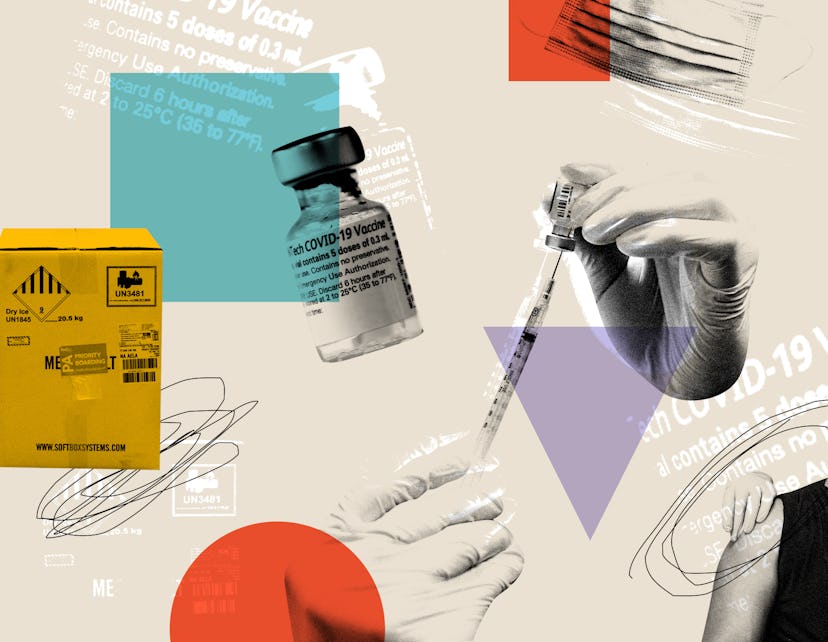Health
I Got The COVID Vaccine On Facebook Live
One doctor on getting her first dose and combating misinformation.

Just days after it was authorized for emergency use by the Food & Drug Administration (FDA), the first doses of Pfizer’s COVID vaccine have been delivered to healthcare workers across the U.S. Dr. Beth Oller, M.D., 40, a family physician in Stockton, Kansas, received her shot on Dec. 18. Here, she tells Bustle about combating misinformation and what getting her first dose was like.
The vaccine is my favorite Christmas present I’ll get this year. I’ve never been excited to get a shot before, but this one truly is exciting. My community is very small and rural, and we didn’t know if we would get vaccines in the first wave or not. So we feel very fortunate to have gotten doses this week.
It felt the same as getting the flu shot: a little bit of pain when it went in, but that was it. About two hours post-vaccine, I'm feeling fine, with no reactions yet. I am definitely less afraid of possible vaccine side effects than I am of the possible post-COVID symptoms. I tell my patients to look at the positives: the vaccine's side effects mean their body is doing its job!
I got vaccinated on Facebook Live, then stayed online for another 15 minutes answering vaccine questions: “Did the FDA cut corners on safety?” “Are there microchips in these?” As they’re asking, they’re saying, “I don’t think this is true, but…” There’s so much misinformation out there right now. I don’t want to label any question as too silly, because if someone is asking, it means other people have the same question.
Frontline healthcare workers — physicians, scientists, epidemiologists, immunologists — are not the kind of people who’ll follow anything blindly. I'm trying to ease people's minds that when I made the decision to be vaccinated, it wasn't just out of blanket trust of the medical establishment. It’s OK to ask questions about something you’re going to put into your body, but researchers have been able to vet this and are not only confident about but excited to get this vaccine. People have asked if I would get it if I were pregnant, and I said absolutely — and I’d feel awesome about it. I’m breastfeeding and I didn't hesitate to get it.
One fire hose doesn't do a lot to a forest fire, but lots of hoses together do better.
In the beginning of the pandemic, when medical professionals were trying to put out information about masking and social distancing, there was so much fear, so much we didn't know about the virus. But as the pandemic’s gone on, there was also a feeling of defeat among healthcare providers, because nobody was doing what they were supposed to. I kept thinking, “When people start dying, everyone else will start wearing masks.” It never did — not when the first deaths happened, not when the schools closed. In my county, we didn’t opt into a mask mandate until just a couple of weeks ago, and, from what I’ve seen, it hasn’t changed mask-wearing at all.
I try to use an analogy that I’ve seen to describe how the pandemic will end. The pandemic right now is a fire, and the vaccine is a very powerful firehose, but the effectiveness of that hose has to do with the extent of the fire. One fire hose doesn't do a lot to a forest fire, but lots of hoses together do better.
Being able to get the vaccine today is history, but in my life, nothing will change. I will keep doing everything I’m doing right now to protect others from COVID — wearing a mask, social distancing. Researchers still don't know if the vaccine keeps people from being asymptomatically infected and potentially spreading the virus, so my diligence has to stay the same. And I'm OK with that. I will continue to preach taking these precautions and the importance of getting vaccinated — for as long as it takes.
This interview has been edited and condensed for clarity.